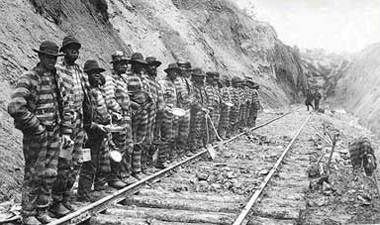Getting to Sundance: Writing the Theatrical Documentary
Q&A with UAlbany Assistant Professor of History and Documentary Studies Sheila Curran Bernard
 |
|
Slavery by Another Name details a rarely discussed chapter in U.S. History: forced labor camps, often operated by state and county governments, that effectively created new forms of slavery in the decades between the Civil War and World War II.
|
ALBANY, N.Y (January 19, 2012) -- Slavery by Another Name, a 90-minute documentary film based on the book by Douglas A. Blackmon, narrated by actor Laurence Fishburne, and written by Sheila Curran Bernard, assistant professor of history and documentary studies at UAlbany, is among 16 American documentary films selected to compete at the 2012 Sundance Film Festival competition January 19 through 29 in Park City, Utah.
Produced by TPT National Productions, Slavery by Another Name explores the labor practices and laws that effectively created new forms of slavery in the decades between the Civil War and World War II: the lease (essentially the sale) of convicts to "commercial interests." Usually, the criminal offense was loosely defined vagrancy or even "changing employers without permission." The initial sentence was brutal enough; the actual penalty, "reserved almost exclusively for black men," was a form of slavery in one of "hundreds of forced labor camps" operated "by state and county governments, large corporations, small time entrepreneurs and provincial farmers."
The film premieres February 13 at 9 p.m. on PBS stations nationwide. A preview screening will be held at UAlbany on Friday, February 3.
Q: What does it mean to "write" a documentary, when it’s based on factual material?
A: There are a lot of misconceptions about documentary writing. One is that documentaries aren’t written, because people tend to think of film writing in Hollywood terms, where a fictional screenplay is completed before the cameras start to roll. How do you script real life or real interviews? So there’s a notion that documentary filmmaking is about showing up and shooting, or perhaps finding visuals to go with information. If there’s a writing credit, people think it refers only to traditional narration.
In fact, writing a documentary is similar to writing any work of creative nonfiction, in that it involves making narrative choices. Which stories will told? How will the work be structured? Who are the characters? What is the point of view? How will evidence be selected and presented? Every documentary film, to some extent, addresses these questions, whether or not a writer is credited. It's a collaborative process that begins well before footage is shot and, unlike Hollywood screenwriting, continues until the last days of editing. At that point, when the words and images are locked, you have a script.
 |
|
UAlbany Assistant Professor of History and Documentary Studies Sheila Curran Bernard
|
Until then, you have a series of increasingly polished outlines and drafts that you revise to incorporate new research and incoming footage and other materials. It’s a lengthy process. As the writer on Slavery by Another Name, I worked for about a year with producer/director Sam Pollard in New York, co-executive producer Douglas A. Blackmon in Atlanta, and executive producer Catherine Allan in Minneapolis, and we’d all meet periodically in New York. The film elements include re-enactments, interviews with scholars and descendants, archival materials and images, and of course, music.
Q: This project began with the Pulitzer Prize-winning book by Douglas A. Blackmon. Did you feel any pressure because of the attention the book has received?
A: Not pressure, just a determination to do right by this powerful book, which Id first read when the New York State Writers Institute brought Doug Blackmon to UAlbany in the fall of 2009. A year later, when Sam Pollard called me about writing the film, I was thrilled. I’ve known Sam for a long time; we jointly directed two films for the PBS series Eyes on the Prize II, and later I was series writer on I’ll Make Me a World, which he co-executive produced.
So I began by reading the book again, very carefully, along with a range of works by other scholars. I also spent time exploring primary sources -- government documents, letters, period newspapers, that sort of thing. From there, it's about deciding what's essential to include and what works best on screen. There’s a big difference between a 400-page book and a 90-minute film.
Q: What are the next steps?
A: On February 11, Slavery by Another Name is being shown at the Pan African Film Festival in Los Angeles, as well as another film I on which I worked, Inside Story, a movie about a soccer player with big dreams. I have a story credit on that film, which merges fictional drama with science-based content about HIV and AIDS; it was created by the Discovery Channel Global Education Partnership and Curious Pictures in consultation with experts worldwide, and is being distributed throughout sub-Saharan Africa.
I was in Washington recently for the North American premiere, and have begun talking with Discovery about future projects. In the meantime, I’m starting a dramatic script set in the 1920s that will begin filming in 2012. It's fun to bring this real-world experience into the classroom and challenge students at what they can achieve through film and television.
![]() For more news, subscribe to UAlbany's RSS headline feeds
For more news, subscribe to UAlbany's RSS headline feeds
Educationally and culturally, the University at Albany-SUNY puts "The World Within Reach" for its 17,500 students. An internationally recognized research university with 50 undergraduate majors and 125 graduate degree programs, UAlbany is a leader among all New York State colleges and universities in such diverse fields as public policy, nanotechnology and criminal justice. With a curriculum enhanced by 300 study-abroad opportunities, UAlbany launches great careers. For more information about this globally ranked University, visit https://www.albany.edu/. For UAlbany's extensive roster of faculty experts, visit www.albany.edu/news/experts.shtml.




